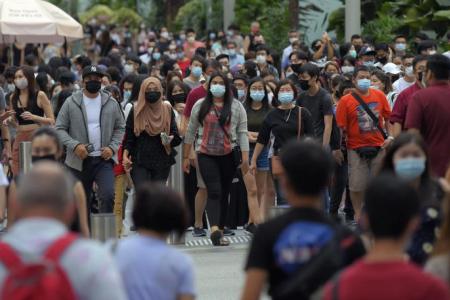Most Singapore residents, especially those younger and better educated, feel racism is an important problem: Survey
A majority of Singapore residents feel that racism remains an important problem today, and those who feel this way tend to be younger and more highly educated, according to a recent survey.
About 56.2 per cent of those polled think that racism remains an important problem, higher than the 46.3 per cent of respondents who felt this way in a 2016 edition of the survey.
This was shown in the findings of the latest CNA-Institute of Policy Studies (IPS) survey on race relations published on Saturday (April 2).
More than 2,000 Singapore residents aged 21 and above were polled between November 2021 and January 2022, with an over-representation of Malay and Indian respondents by twice their national proportions to ensure minorities are well-represented in the survey.
The survey also showed that respondents have grown more open to the idea of a non-Chinese prime minister or president over the last five years.
Most of those surveyed were accepting of Singaporean Malays (82.2 per cent) or Indians (82 per cent) as the president, higher than the 65.5 per cent and 70.6 per cent respectively in 2016.
On the other hand, respondents were very uncomfortable with the idea of a new citizen from any country taking on these political roles.
Overall, younger respondents were found to be more likely than older ones to feel that racism is an important problem today - 63 per cent of those between 21 and 50 years old felt this way, compared with 46.8 per cent for those aged between 51 and 65 and 47.4 per cent for those above 65.
"The stronger focus on racism among younger respondents may be due to their greater exposure to commentary about race issues on social media, where woke and cancel culture encourage minorities in particular to call out examples of casual racism. Older respondents tend to have lower levels of engagement with online media," the report noted.
Those with higher education levels were also shown to be more likely to think racism is an important problem, with the difference more pronounced among Chinese and Malay respondents.
Some 68.3 per cent of Chinese degree holders felt racism is an important problem, compared with 34.2 per cent of those with below secondary education. For Malay respondents, 85.4 per cent of graduates believe racism is an important problem, compared with 50.9 per cent of those with below secondary education.
It was less differentiated for Indian respondents, with 63 per cent of graduates and 51.7 per cent of those with below secondary education feeling this way.
The findings also showed that most respondents of all races believe that success in Singapore is not contingent on race, similar to sentiments in the 2016 survey.
At the same time, 97 per cent of those surveyed were optimistic about the future of meritocracy for minorities, believing that things would either stay the same or improve with regards to minorities being viewed based on merit rather than race.
But there was a divided response on whether there is majority privilege in Singapore. About 53.9 per cent of respondents agreed or strongly agreed that being of the majority race is an advantage in Singapore society, similar to the 2016 findings.
This division was also reflected in sentiments on whether the majority race has more resources and opportunities than other races.
However, minority race respondents were found to have different thoughts on majority privilege - most Malay and Indian respondents agreed or strongly agreed that members of the majority race generally have more resources and opportunities than other races, compared to just 42.6 per cent of Chinese respondents.
The survey also found that respondents have become slightly more accepting of Singaporean Malays and Indians as family members as compared with five years ago, and the level of comfort with new citizens marrying into the family has also risen.
When it came to professional relationships, respondents demonstrated approximately the same level of acceptance for Chinese, Malay and Indian Singaporeans as colleagues or subordinates. However, they showed lower acceptance of new citizens as co-workers.
In addition, those polled showed mostly positive reception towards economic-related policies of the Ethnic Integration Policy (EIP) and self-help groups, with over 77 per cent sayingthe EIP helps to preserve racial harmony in Singapore.
The EIP determines the racial quota in Housing Board blocks or housing neighbourhoods.
When it came to policies related to politics, respondents showed more positive sentiments towards the group representation constituency (GRC) system than the reserved presidency.
Respondents felt that the GRC was more likely to help preserve racial harmony in Singapore and safeguard minority rights, and less likely to disadvantage the majority race and minorities. In particular, 77.1 per cent of those polled felt the GRC helps to preserve racial harmony, while 70.4 per cent felt the same about the reserved presidency.
Meanwhile, many respondents were found to be indifferent about potential future developments to do with race in Singapore, with the proportions who indicated that a given development would make no difference ranging from 40 per cent to 55 per cent. But 62.9 per cent of respondents felt that greater intercultural understanding would be good or very good.
They were split over whether it would be beneficial for society if people felt able to speak up freely about their ethnic identity not being properly respected, or about problems with different ethnic cultures. This indicates ambivalence about greater and more open national discourse on racial issues, the report noted.
It also noted the survey shows that while work remains to be done in race relations, Singapore and its people have the willingness to continue the journey together.
Get The New Paper on your phone with the free TNP app. Download from the Apple App Store or Google Play Store now


